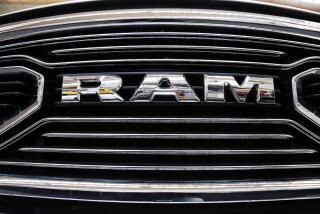4 Auto Makers Close to Settling Charges of Deception in Leasing
- Share via
Four auto makers are close to a settlement of charges that they used deceptive practices in marketing car leases in the U.S., according to people involved in the talks.
General Motors Corp., Isuzu Motors Ltd., Honda Motor Co. and Mitsubishi Motors Corp. are in late-stage negotiations with the Federal Trade Commission and as many as 20 state attorneys general.
A settlement would probably require car makers to clearly disclose leasing costs to consumers and may include fines and payment of legal expenses, said state officials and an industry lawyer involved in the talks.
“Some of the problems that are occurring are general failure to adequately disclose what the real terms of the transaction are,” said Joseph Goldberg, director of Pennsylvania’s Bureau of Consumer Protection. “It’s not just advertising and it’s not just deception.”
Auto company executives did not immediately respond to requests for comment.
A settlement would end state and federal investigations that have lasted more than a year, and it would come as car leasing’s popularity is soaring.
Several states--including California, New York and Florida--have enacted laws requiring certain disclosures in auto leasing agreements.
About 30% of all new cars are leased today--twice as many as four years ago--and the figure is expected to grow as car prices rise.
Consumer advocates say shoppers are often bewildered by complicated lease provisions and hidden charges that make it difficult to know how much they’ll pay. Advertisements don’t make it clear whether touted sticker prices apply to buying or leasing a vehicle, critics say.
“The manner in which the auto industry is conducting itself is reprehensible,” said Howard Metzenbaum, the former Democratic senator from Ohio who heads the Consumer Federation of America, a nonprofit association of about 240 consumer rights groups.
“It’s impossible for any normal human being to understand the ads on television with 10 lines of printed material in less than 10 seconds,” he said.
Different auto makers are in different stages of the settlement talks. GM, Honda, Isuzu and Mitsubishi have already received draft complaints and consent decrees, which the FTC routinely uses as starting points for settlement talks, according to participants.
Others, including Ford Motor Co. and Chrysler Corp., are still in the process of responding to FTC requests for car-leasing information, an industry lawyer and state officials said.
However, Della DiPietro, a Ford spokeswoman, said the company has not received a request for such information. She said Ford has been ahead of other auto makers in making its lease agreement consumer-friendly.
“We are very concerned that people are not confused and have a happy experience” when they lease a car from Ford, DiPietro said. “We have more to lose” if they don’t “and more to gain” if they do, she said.
Chrysler did not respond to a request for comment.
Car makers would probably reach separate agreements with the states and the FTC, although the agreements are likely to be announced at the same time. Attorneys general in Arizona, Connecticut and Florida have been negotiating on behalf of the other states.
An FTC spokeswoman declined to comment on the settlement talks, saying that “all FTC investigations are nonpublic.”
*
The settlements are likely to require auto makers to agree to disclose the actual monthly cost of leasing a car in their advertisements, promotional signs and lease agreements, as well as to explain how they arrived at that figure.
Car makers say they have been acting on their own to improve leases.
The Assn. of Consumer Vehicle Lessors, which represents the leasing arms of the largest auto makers, said it has adopted voluntary standards for cost disclosure, including suggesting that the manufacturers provide a separate box listing lease costs separate from other information.
It’s unclear whether consumer protection agencies will seek fines for violations of existing rules regulating deceptive advertising and trade practices.
“What makes this much more of a wild card is that across the board all of the states have much broader authority to get relief than the FTC,” said Barry Cutler, a Washington attorney representing two auto makers being asked to provide information to consumer protection agencies.
About two years ago, the Federal Reserve Board, which has oversight of leasing transactions, began reviewing regulations.
The Fed now is revising Regulation M of the Consumer Leasing Act, which hasn’t been changed since 1981, to make legally required language in contracts clearer. In recent weeks, the Fed staff has held meetings with industry representatives and consumer advocates to get feedback on the proposed changes.






